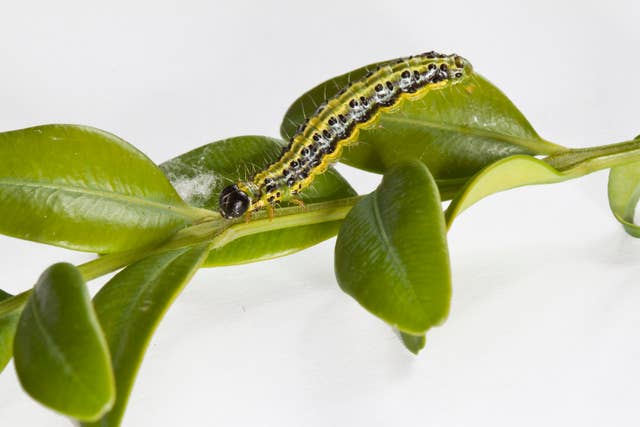Gardeners have their hands full tackling box hedge-eating caterpillar
From private back gardens to historic National Trust properties, much-loved box trees are under attack from an invasive pest.

Gardeners are having to get hands-on to tackle the spread of an invasive caterpillar that is eating its way through the nation’s box trees and hedges.
Box tree moth is a native of East Asia which was first discovered in the UK in 2011 and whose caterpillars feed voraciously on box plants under a blanket of pale, fine webbing that can cover infected plants.
Green-fingered amateurs are being advised, where practical, to remove the caterpillars by hand if they find an infestation on their prized plants.

Other options gardeners can try include pheromone traps, nematodes or insecticides – but these require forceful spraying and should not be done when plants are in flower due to the threat to pollinating insects, the Royal Horticultural Society said.
And it is not just private back gardens that are under attack from the caterpillar, which has topped the RHS list of pests based on queries from gardeners three times in the past four year.
The National Trust has seen some of its important historic gardens, where box hedges are a significant feature, such as Ham House in London and Cliveden in Berkshire, hit by the pest.
RHS entomologist Dr Stephanie Bird said the bug is spreading and is “noticeable” when it is on the plants.
A plant can recover from a single defoliation event, and is not necessarily dead even if it loses its leaves, but the caterpillar will recur through the growing season and in subsequent years.
The caterpillars can also eat the bark on areas of new growth which means the plant will no longer grow from that section.

One option is to grow something other than box, Dr Bird said.
“At RHS Garden Wisley we’ve got a box alternatives garden where some of these are growing.
“Some look very similar to box and you can do similar things.”
But she warned: “These will have their own pests and diseases. Box is really widely grown so we’re well aware of the problems it faces.
“You could spend money ripping out your box and plant something else, and find it is susceptible to something.”
Simon Toomer, the National Trust’s national specialist for plant conservation, said he was encouraging “vigilance” from staff at vulnerable properties, as the situation could get very bad very quickly.
Box was one of the plants used to create geometric designs in formal gardens in the past, and the Trust uses it to recreate those styles, which benefit from the plant being evergreen and “clippable” into tight shapes.

Staff are being urged to check every day for caterpillars at this time of year and manually remove the pests – doing everything from vacuuming them up to picking them off by hand.
The Trust is also trialling other methods, including deterring the caterpillars using aromatic oils such as rosemary and lavender.
Caterpillars are not the only problem facing the historic gardens the National Trust looks after, with box hedges already hit by a fungal disease called box blight.
On the issue of replacing box with other plants, Mr Toomer said: “To some extent we’ve already been prepared through box blight to think about alternatives but they’re very much a second-best in many places.
“When we feel it’s part of the place we will fight as much as we can.”





